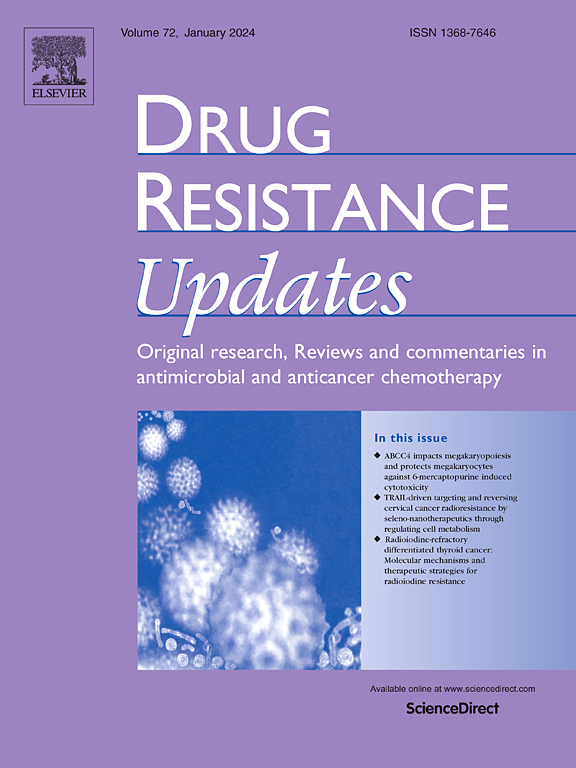柠檬酸盐为何以及如何使恶性肿瘤对免疫疗法敏感
IF 21.7
1区 医学
Q1 PHARMACOLOGY & PHARMACY
引用次数: 0
摘要
免疫疗法,无论是单独使用还是与化疗联合使用,在多种实体癌中的疗效都很有限。原发性或继发性抗药性的产生有多种因素。其中,癌细胞的新陈代谢经常依赖有氧糖酵解,它们通过将肿瘤微环境(TME)中的葡萄糖转用于自身获利,同时分泌乳酸维持免疫抑制细胞的氧化代谢,从而促进细胞毒性免疫细胞的衰竭。在此,我们建议将目前基于使用免疫检查点抑制剂(ICIs)的治疗方法与大剂量柠檬酸钠(SCT)相结合,因为柠檬酸钠能抑制癌细胞代谢(通过靶向糖酵解和氧化代谢),并能活跃抗肿瘤免疫反应。事实上,正如临床前研究显示的那样,SCT 可减少癌细胞生长,促进细胞死亡,提高化疗效果。此外,由于质膜柠檬酸载体 pmCIC 主要在癌细胞中表达,而在免疫细胞和非转化细胞中表达较低或不表达,我们认为 SCT 对癌细胞代谢的抑制可能会增加 TME 中葡萄糖的可用性,从而促进抗肿瘤免疫细胞的功能。同时,TME 中乳酸量的减少可能会降低免疫抑制细胞的功能。临床前研究表明,SCT 可以通过增强 T 细胞的浸润和活化,以及使巨噬细胞向 TAM1 样表型的再极化来增强抗肿瘤免疫反应。因此,这种简单而廉价的策略可能会对提高当前免疫疗法在人类实体瘤中的疗效产生重大影响,我们鼓励在临床试验中进行测试。本文章由计算机程序翻译,如有差异,请以英文原文为准。
Why and how citrate may sensitize malignant tumors to immunotherapy
Immunotherapy, either alone or in combination with chemotherapy, has demonstrated limited efficacy in a variety of solid cancers. Several factors contribute to explaining primary or secondary resistance. Among them, cancer cells, whose metabolism frequently relies on aerobic glycolysis, promote exhaustion of cytotoxic immune cells by diverting the glucose in the tumor microenvironment (TME) to their own profit, while secreting lactic acid that sustains the oxidative metabolism of immunosuppressive cells. Here, we propose to combine current treatment based on the use of immune checkpoint inhibitors (ICIs) with high doses of sodium citrate (SCT) because citrate inhibits cancer cell metabolism (by targeting both glycolysis and oxidative metabolism) and may active anti-tumor immune response. Indeed, as showed in preclinical studies, SCT reduces cancer cell growth, promoting cell death and chemotherapy effectiveness. Furthermore, since the plasma membrane citrate carrier pmCIC is mainly expressed in cancer cells and low or not expressed in immune and non-transformed cells, we argue that the inhibition of cancer cell metabolism by SCT may increase glucose availability in the TME, thus promoting functionality of anti-tumor immune cells. Concomitantly, the decrease in the amount of lactic acid in the TME may reduce the functionality of immunosuppressive cells. Preclinical studies have shown that SCT can enhance the anti-tumor immune response through an enhancement of T cell infiltration and activation, and a repolarization of macrophages towards a TAM1-like phenotype. Therefore, this simple and cheap strategy may have a major impact to increase the efficacy of current immunotherapies in human solid tumors and we encourage testing it in clinical trials.
求助全文
通过发布文献求助,成功后即可免费获取论文全文。
去求助
来源期刊

Drug Resistance Updates
医学-药学
CiteScore
26.20
自引率
11.90%
发文量
32
审稿时长
29 days
期刊介绍:
Drug Resistance Updates serves as a platform for publishing original research, commentary, and expert reviews on significant advancements in drug resistance related to infectious diseases and cancer. It encompasses diverse disciplines such as molecular biology, biochemistry, cell biology, pharmacology, microbiology, preclinical therapeutics, oncology, and clinical medicine. The journal addresses both basic research and clinical aspects of drug resistance, providing insights into novel drugs and strategies to overcome resistance. Original research articles are welcomed, and review articles are authored by leaders in the field by invitation.
Articles are written by leaders in the field, in response to an invitation from the Editors, and are peer-reviewed prior to publication. Articles are clear, readable, and up-to-date, suitable for a multidisciplinary readership and include schematic diagrams and other illustrations conveying the major points of the article. The goal is to highlight recent areas of growth and put them in perspective.
*Expert reviews in clinical and basic drug resistance research in oncology and infectious disease
*Describes emerging technologies and therapies, particularly those that overcome drug resistance
*Emphasises common themes in microbial and cancer research
 求助内容:
求助内容: 应助结果提醒方式:
应助结果提醒方式:


